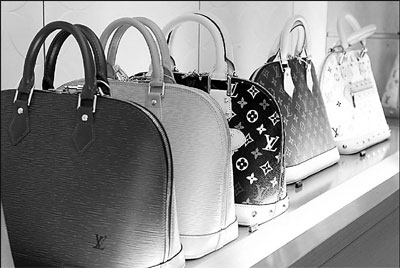

Luxury goods maker Louis Vuitton (LV) has been dragged into an unexpected patent controversy that could require the French brand to withdraw some of its classic products from the Chinese market.
The dispute began when Wang Jun, a self-employed clothing retailer in Wuhan, capital of central China's Hubei province, claimed that he registered a design patent at the State Intellectual Property Office (SIPO) similar to LV's classic monogram.
Because he owns the patent, Wang may be able to keep some of LV's collection out of China, Wang's lawyer Chen Wenfeng tells China Business Weekly.

"We plan to file an application to the General Administration of Customs for patent protection, which may mean a ban on imported LV products that are similar to Wang's patented design," Chen says.
Louis Vuitton Matellier Co has thus far declined to comment on the dispute over its monogram, the logo the luxury giant created in 1896 that is now familiar to consumers around the world.
LV arrived in China 16 years ago when it opened its first boutique on the mainland at Beijing Peninsula Hotel. It now has 18 stores in 14 cities, but its growth accelerated only in recent years with shops in four more cities - Wenzhou, Kunming, Shenyang and Nanjing, according to its official website.
"It is too bold to say that LV, such a world-famous brand, lacked awareness of intellectual property right (IPR) protection, but the company may not have anticipated the tremendous market potential for luxury goods in China at that time," says Zhang Ping, a professor with Peking University who specializes in IPRs.
With a hobby of studying the development of world-famous fashion brands, Wang in 2002 found a "loophole" in LV's intellectual property protection in China. The company registered its English and Chinese brand Louis Vuitton for clothing, leather goods, jewelry and precious metals when it planned its entry into the Chinese market in 1985, but did not file for a patent on its monogram.
Wang then applied for a patent on a pattern similar to LV's monogram for handbags, leather goods, tags and accessories. In October 2003, SIPO officially approved his patent.
Wang's successful registration is partially due to the loose examination system in China, analysts say. Unlike Japan and the United States, which require both formal and substantial examination of designs, China's check is only a matter of processing the application, says Zhang Shiqiong, an attorney specializing in IPR with the Beijing Hongsheng law firm.
"If the applicant submits qualified documents and pays the application fees in time, most obtain the patent," Zhang says.
She explains that a merit of the system is that it streamlines the registration process and as a result materials can be put into practical use more quickly.
"But this process can lead to repetitious accreditation, which directly increases the number of demands for patent invalidation," she says. "This may drag the parties concerned into time- and energy-consuming litigation procedures, as it will take a long time for the court to make final rulings."
Louis Vuitton Matellier demanded the re-examination board of SIPO rescind Wang Jun's patent in 2004, but the board did not accept the request as it said LV failed to submit any court rulings that can prove conflict over the rights.
Last April, Louis Vuitton filed a lawsuit against the SIPO re-examination board to the Beijing No 1 Intermediate People's Court. A final ruling has not yet been rendered.
"It is very hard for LV to overturn the ruling of the re-examination board as the latter has a sufficient legal basis," Chen says.
"So-called 'pre-emptive' registration is a very common practice in the market economy, as intellectual property rights cannot be defined as clearly as ordinary property rights," says Zhang Ping. "Many Chinese brands have also suffered from the same situation in overseas markets."
Well-known Chinese brands, including household appliance maker Hisense, traditional Chinese medicine Tongrentang, roast-duck restaurant chain Quanjude and the liquor Wuliangye have had their trademarks registered by others in some countries, Zhang Ping adds.
Wang claims he wants to negotiate with LV to release the patent - demanding either an exclusive dealership for the Wuhan region or 120 million yuan, according to Hong Kong's Wenweipo newspaper.
Wang's demands may not be met, as LV claims on its website that all its products are sold through its wholly owned retail network rather than through franchises.
Wang says he may use the patent to manufacture handbags and other accessories under the Chinese trademark Luyi Weideng - the Chinese pronunciation of Louis Vuitton - if LV refuses to grant him a dealership, according to the Hong Kong newspaper.
Wang declined to comment when reached by China Business Weekly.
"The dispute may not come to an end in the near future," lawyer Zhang Shiqiong says. "If Wang Jun uses the patent for mass production, LV may retaliate by using laws that protect well-known brands or sue him for unfair competition."
Editor's note: The IPR Special is sponsored by the State Intellectual Property Office and published by China Business Weekly. To contact the Intellectual Property Office, the IPR Special hotlines are 8610-64995421 or 8610-64995826, and the e-mail address is ipr@chinadaily.com.cn.
(China Daily 03/03/2008 page9)













